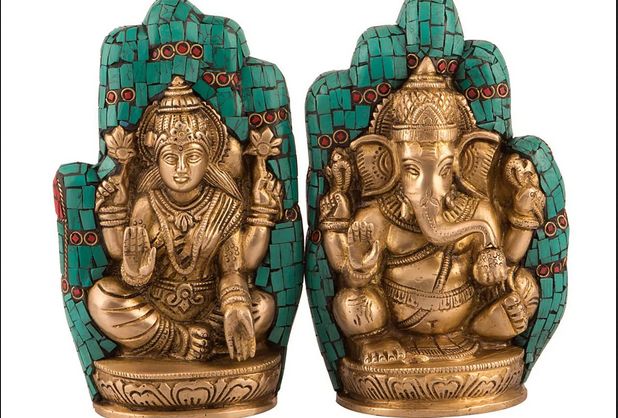On the first day of the Diwali celebrations, houses and business premises are renovated and decorated. Colorful and vibrant entrances are made with beautiful traditional motifs of Rangoli designs to welcome the goddess of wealth and prosperity (Lakshmi). To signify her long-awaited arrival, tiny footprints are made at home with rice flour and kumkum. Worshiping the Laxmi Ganesh brass murti is the most significant activity of the festival. These small pretty things are what make Indian culture rich and famous. In addition, all the events have significance in their own way.
In addition to diyas and lamps, to decorate your home, you can add some good options such as brass Ganesha idols for home. You can also place a Laxmi Ganesh brass murti in your office for prosperity.
The lamps and diyas are lit throughout the night. Diyas, lamps, and lanterns have many reasons associated with them, and they are so important in Diwali celebrations. Their celebrations are five days long.
Dhanteras:
This day is considered auspicious. Hence, women buy some gold or silver or some new utensils, and in some parts of India, animals are also worshiped. The day is considered to be the birthday of Dhanvantari (Lord of Ayurveda or physician of the gods) and is also celebrated as Dhanvantari Jayanti. On this day, lamps are lit throughout the night to worship Yama, the god of death, hence it is also known as' Yamadeepdaan'. It is believed to remove the fear of untimely death.
NarkaChaturdashi:
It is a tradition to wake up early in the morning on this day and take a bath before sunrise. The story goes that the demon king Narakasura—the ruler of Pragjyotispur (a southern province of Nepal)—after defeating Indra Deva, snatches away Aditi's (mother of the gods) adorable earrings and imprisons sixteen thousand daughters of gods and sages.
The day after Narka Chaturdashi, Lord Krishna killed the demon and recovered Aditi's precious earrings, freeing the imprisoned girls. The women massaged their bodies with aromatic oil and took nice baths to wash off the dirt from their bodies. Hence, this tradition of bathing early in the morning symbolises the victory of the Divine over evil. This day represents the announcement of a future full of goodness.
The third day is the most important day of the ceremony - Lakshmi Puja. Diwali night is the darkest night of the year. Despite being the darkest; this day is considered very auspicious. The impenetrable darkness of night slowly disappears as tiny twinkling lamps light up all over the city. Lakshmiji is said to visit the earth and bestow blessings for abundance and prosperity.On this evening, people do Lakshmi Puja and distribute homemade sweets to everyone. It is also the day when Lord Rama returned to Ayodhya with Mata Sita and Lakshmana after 14 years of exile after killing Ravana.
Why do we worship Laxmi Ganesh on Diwali?
A story from Hindu mythology says that Lakshmi adopted Ganesha from Parvati. Laxmi was wealthy and the owner of all luxury and prosperity, so all that was passed on to Ganesh as well. So she announced that worshiping Ganesha is equally important if one wants to have the pleasure of wealth and success. To please MaaLaxmi, people worship a brass Ganesh murti.
Govardhan Puja
The fourth day of the ceremony is known as Varsha Pratipada and marks the coronation of King Vikram. It is also the day when Lord Krishna raised the Govardhan Mountain to protect the people of Gokul from the wrath of Lord Indra's torrential rains.
BhaiDooj represents a symbol of love between brothers and sisters. The brothers give them a gift as a token of their love.
It is believed that wealth (Lakshmi Devi) is very transient and it remains only where there is hard work, honesty, and gratitude. In Shrimad Bhagvat, there is a mention of an incident when Goddess Lakshmi left the body of King Bali and wanted to go with Lord Indra. On questioning, she said that she lives only where there is 'truth', 'charity', 'tapas', 'valor', and 'dharma'. This Diwali let us all pray and feel grateful.


Share:
Add style and charm to décor with brass hanging diyas online.
It is auspicious to have a Bajrangbali Murti in your home or office